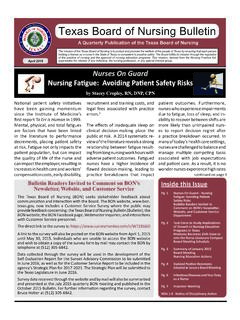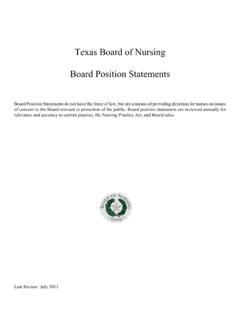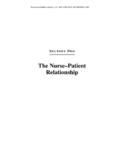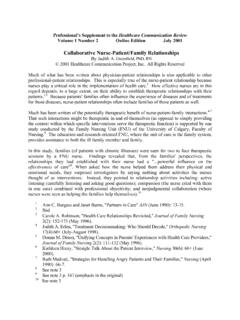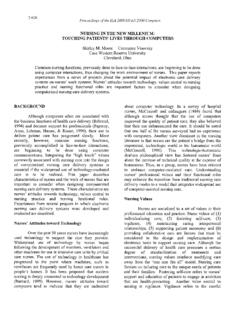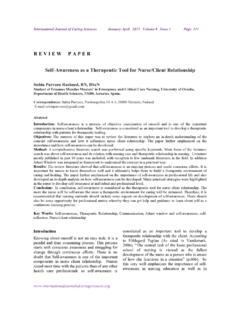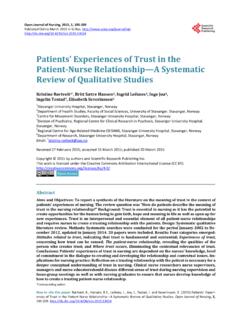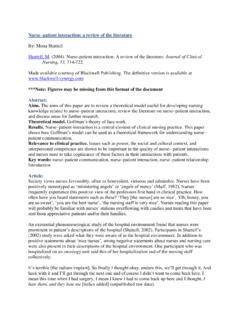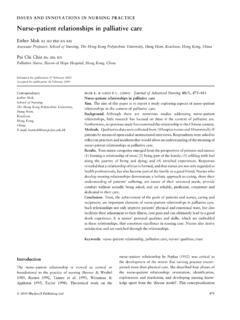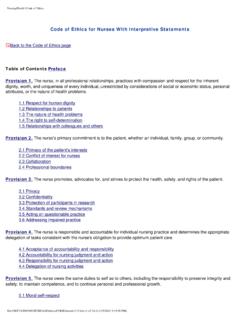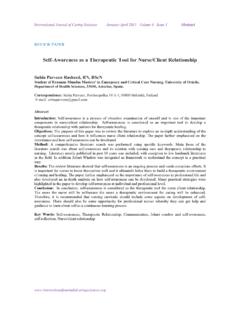Transcription of Disciplinary Sanctions for Fraud, Theft, and Deception
1 Disciplinary Sanctions for fraud , theft , and DeceptionThe Texas Board of Nursing (Board), in keeping with its mission to protect the public health,safety, and welfare, believes it is important to take a strong position regarding the licensureof individuals who have engaged in dishonest behaviors that may place the public orpatients at risk. The Board is concerned with individuals who have stolen ormisappropriated property, money, or other possessions from patients , who have engagedin fraudulent behavior towards patients , who have engaged in fraud towards governmentprograms or funds, , Medicare and/or Medicaid, or who have been convicted orreceived a judicial order involving a crime or criminal behavior of theft or Deception to anextent that such conduct may be repeated in connection with the individual s practice ofnursing with patients who are vulnerable, thereby affecting the nurse s ability to safely carefor patients .
2 Furthermore, the Board s policy is consistent with and supports the Governor sExecutive Order RP36 dated July 12, 2004, relating to preventing, detecting, andeliminating fraud , waste, and abuse that can be found at: Board s position applies to all nurse license holders and applicants for Board adopts the following assumptions as the basis for its * under the care of a nurse are vulnerable by virtue of illness or injury, andthe dependent nature of the nurse -patient who are especially vulnerable include the elderly, children, the mentally ill,sedated and anesthetized patients , those whose mental or cognitive ability iscompromised and patients who are disabled or frequently bring valuables (medications, money, jewelry, items ofsentimental value, checkbook, or credit cards) with them to a health care frequently provide care in private homes and home-like settings where allof the patient s property and valuables are accessible to the frequently provide care in settings without direct Board considers the following behaviors important in evaluating whether an individualpossesses the integrity and honesty to practice from a patient raises serious concerns whether the nurse can be trusted torespect a patient s property/possessions in the or Deception that occurs outside of the workplace, including conviction or ajudicial order involving criminal behavior, may raise concerns as to whether thesame misconduct will be repeated in the workplace and, therefore, place patientsat risk for theft and Deception .
3 * The terms resident or client are often substituted for the term patient in health carefacilities. For the purposes of this document patient includes all of these terms. fraud , theft , and DeceptionPage 2 Crimes Related to fraud , theft , and DeceptionFraudulent behavior is a crime of moral turpitude. The Board may rely solely on theconviction of a crime or probation for a crime, with or without an adjudication of guilt, todeny, suspend, limit, or revoke a license. Criminal conduct involving fraud , theft , and/ordeception may also reflect a lack of good professional character (Section of 22 Texas Administrative Code). In addition, the Board is also concerned with fraud involvinggovernment funds or programs, such as Medicare or Medicaid. This type of fraud increasesthe price employers pay for worker s compensation, drains the unemployment insurancefund, and steals from those in need of vital Medicaid and/or Medicare services.
4 Aconviction or a judicial order involving the criminal behaviors of fraud , theft , falsification ordeception is a concern to the Board but may not in and of itself disqualify a person fromlicensure. The magnitude of the behavior is not necessarily a major factor the Board will related to the crime that would concern the Board the most are evidence ofpremeditation, lack of remorse, and failure to pay restitution. The presence of these factorsis evidence to the Board that the likelihood of the same behavior being repeated is greatenough that patients may be at risk for the same conduct. Acts of an impulsive naturewhere there is insight/remorse regarding the conduct may be mitigating factors for theBoard to consider. The criminal behavior of fraud , theft , or Deception will be evaluated onan individual basis considering the foregoing factors.
5 It should be noted that if a nurse is imprisoned following a felony conviction, felonycommunity supervision revocation, revocation of parole, or revocation of mandatorysupervision for a crime involving fraud , theft , or Deception , the Board shall revoke thenurse s license, regardless of the conduct associated with or the circumstancessurrounding the crime. Chapter 53 of the Texas Occupations Code and 22 TexasAdministrative Code Section governs the consequences of criminal convictions andrequires revocation of a nurse s license if there is imprisonment as stated above. of 22 Texas Administrative Code is also applicable to criminal conduct. Acts offraud, theft , or Deception will preclude a nurse from working in a home health orindependent setting during the stipulation period.
6 If circumstances do not warrant removalfrom that practice setting, supervision in the home health or independent setting will berequired. Discipline by the Board will likely require the nurse to pay a civil penalty or fineand restitution as authorized by the Nursing Practice Act and Board rules. The Board willtake under consideration any conviction or conduct that falls within the youthfulindiscretion factors as stated in Board rules (Section of 22 Texas AdministrativeCode), factors stated in Texas Occupations Code chapter 53 regarding criminal convictionconsequences, and other factors in Sections and of 22 Texas AdministrativeCode (Good Professional Character and Licensure of Persons with Criminal Convictions). theft from a PatientTheft from a patient or engaging in fraudulent or deceitful behavior or conduct with orinvolving a patient is never acceptable.
7 theft of patient money, property, medicine,valuables, or items of sentimental value is ground for suspension or revocation of , theft , and DeceptionPage 3A license may be denied if the applicant engaged in theft while functioning in the role of acare giver. Other fraudulent conduct or Deception towards a patient is unacceptable, butnot necessarily a disqualification from licensure. These cases will be considered on anindividual basis and may be disciplined at a level less than revocation or may bereprimanded or warned and limited from independent settings following a thoroughinvestigation. Factors such as insight, remorse and premeditation will be considered as towhether a Disciplinary sanction is imposed. The Board believes that employers of nurseshave the responsibility to have safeguards in place to ensure that patients are not subjectedto acts of fraud , theft , or from the WorkplaceTheft is an intentional act regardless who is the victim of the theft .
8 The Board s position ontheft from an employer is not as strong as its position on theft from a patient. However, ifa nurse engages in fraud , theft , or Deception toward his/her employer, there is thepossibility that the nurse will also engage in the same behavior towards patients . TheBoard will consider the factors of premeditation, remorse and restitution as well as thesteps taken by the employer toward the nurse in deciding whether or not discipline shouldbe for ReinstatementA person who has been denied licensure or whose license has been revoked has the righto petition the Board for reconsideration or reinstatement after one year has elapsed. Theburden of proof that the person does not pose a danger for fraud , theft , or Deception towardpatients remains with the petitioner or applicant. Recommended SanctionsThe minimum allowed sanction for fraud , deceit, intentional, and/or willful misconduct thatresults in harm or the potential for harm to another person will be removal from practice inan independent setting, including but not limited to home health and agency nurse , practiceunder the supervision of another registered nurse , if practicing as a RN, or under thesupervision of a licensed vocational nurse or registered nurse , if practicing as a LVN,employer reports, and a punitive fine.
9 The recommended sanction may be revocation. Approved and adopted on July 26, 2002, modified on April 23, 2004, October 22, 2004 (includedMedicare/Medicaid fraud ), and January 18, 2008 (based on recommendations adopted by the Eligibility andDisciplinary Task Force on November 30, 2007).
